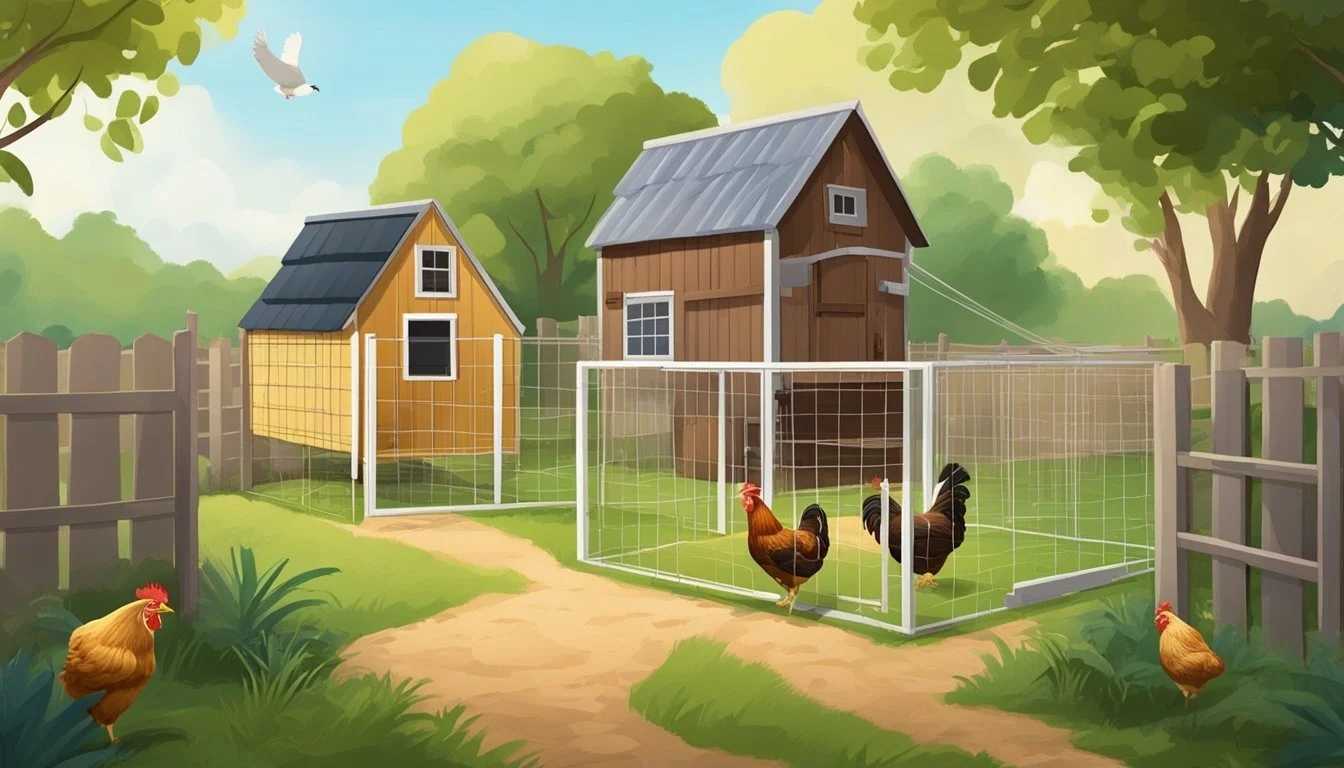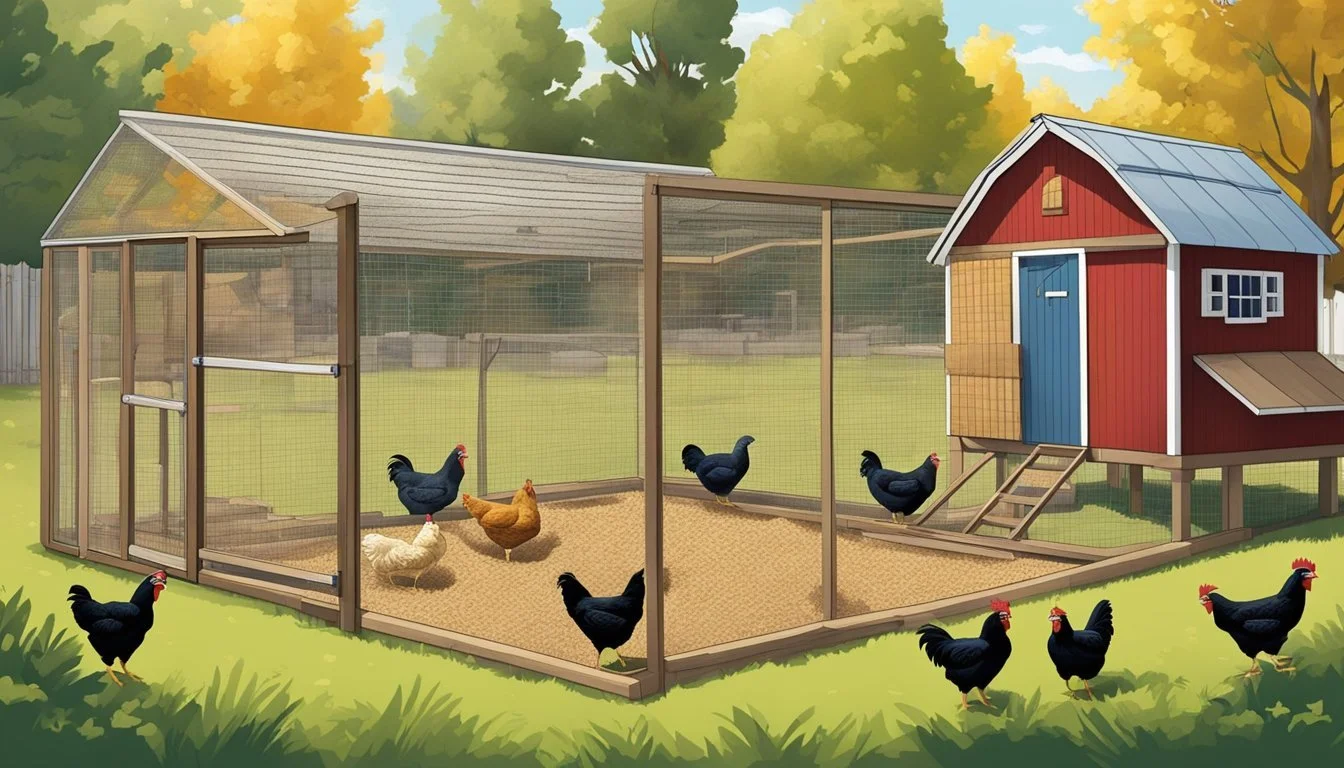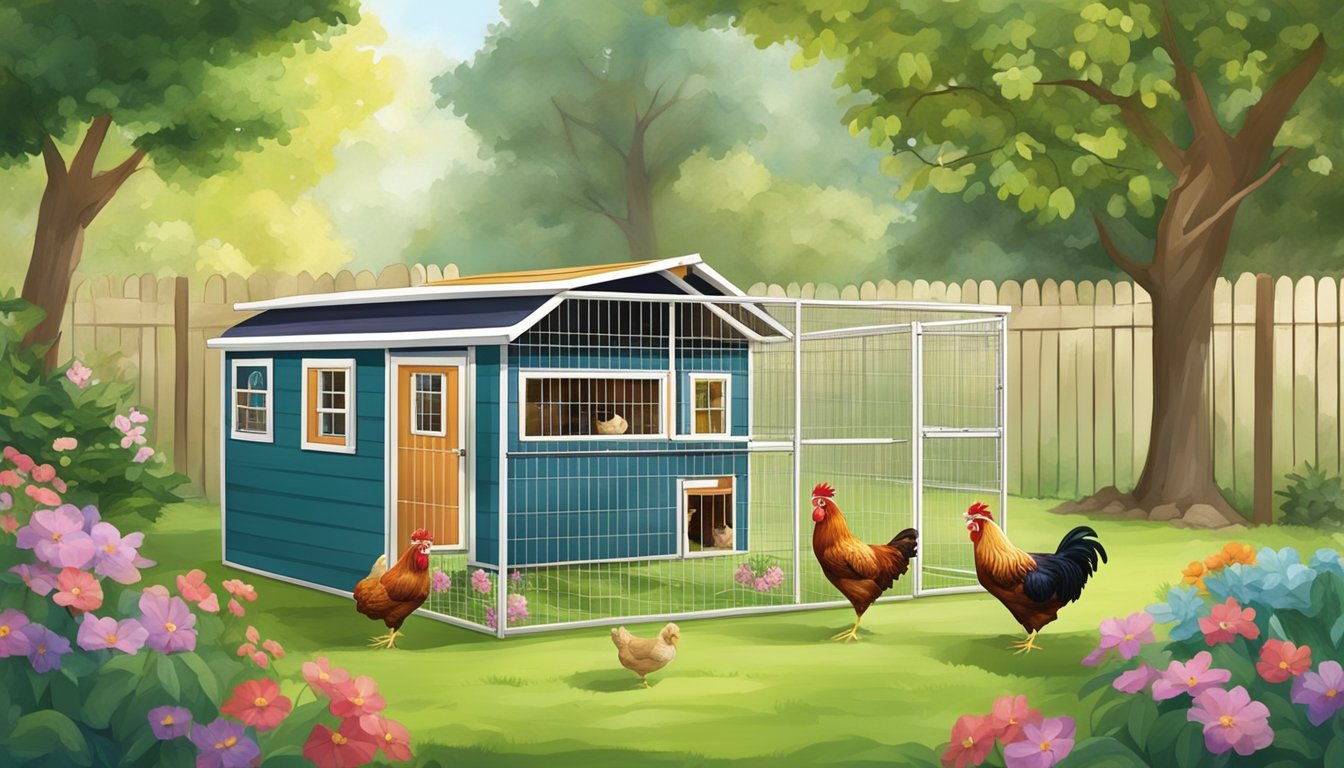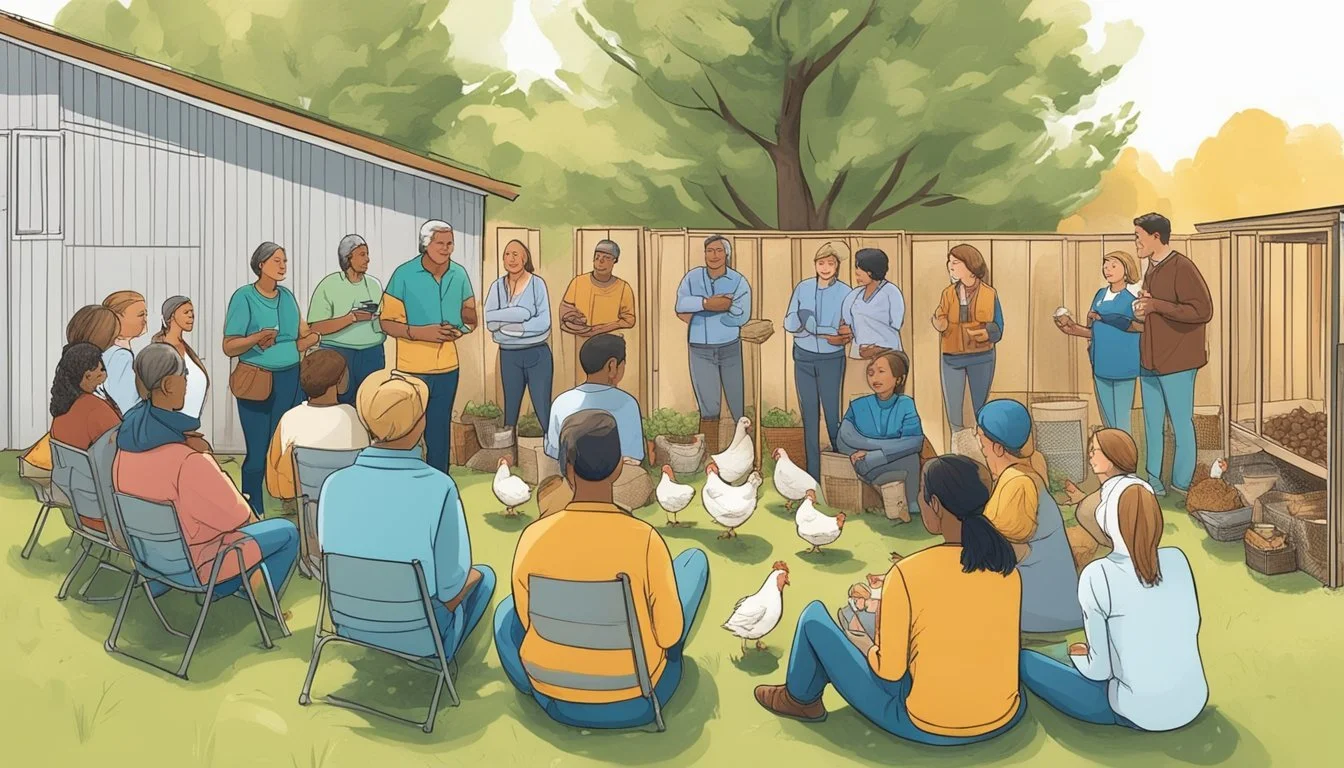Raising Backyard Chickens in Lafayette, CO
The Ultimate Guide for Urban Poultry Farmers
Raising backyard chickens in Lafayette, Colorado, is a growing trend among residents looking to embrace a more sustainable lifestyle and connect with local food sources. It is recognized as a productive hobby that can provide fresh eggs, natural garden fertilization, and even educational opportunities for families and individuals interested in learning about animal husbandry and environmentally friendly practices. However, adhering to local regulations is crucial as Lafayette has specific guidelines in place to ensure that the keeping of backyard chickens respects both the welfare of the animals and the community.
Before embarking on building a coop in the backyard, prospective chicken keepers in Lafayette must apply for a backyard chicken license and pay the requisite fee upon application approval. The local ordinance has clear conditions set for the keeping of backyard chickens, which enhances the coexistence of this activity within residential and school use areas. The community values not only the productive aspects of raising chickens but also the importance of maintaining neighborhood harmony through responsible practices.
Local resources such as workshops led by experienced chicken keepers are available in Lafayette, offering valuable knowledge on sustainable coop construction and essential care practices. These resources underscore a commitment to upholding an odor-free and clean environment that is both conducive to healthy, productive chickens and considerate of neighboring properties. For those looking to join the local movement of raising backyard chickens, Lafayette provides a supportive framework that balances personal interests with community well-being.
Understanding Local Chicken Laws
Local ordinances in Lafayette, Colorado, necessitate that residents comply with specific regulations regarding the raising of backyard chickens. These laws ensure the welfare of the chickens, as well as address the concerns of the community.
City Ordinances and Zoning
In Lafayette, city ordinances dictate that chicken coops must be situated at least 10 feet from property lines and 25 feet from any neighboring houses. The relevant zoning laws require that these coops maintain clean and sanitary conditions. Additionally, each chicken must have a nesting box. It is crucial for residents to verify with city zoning to make sure backyard chickens are permitted in their specific area, as regulations can be subject to change.
Number of Chickens Allowed
The precise number of chickens allowed per property within Lafayette can vary; however, common standards allow a reasonable number. The city's stance is to permit enough birds to provide for personal use without creating issues for neighbors. Specific numbers could be regulated by lot size or other local considerations, therefore checking the latest municipality regulations is advised. It is also standard that only hens are allowed, as roosters are commonly prohibited due to noise concerns.
Choosing the Right Chicken Breed
Selecting the ideal chicken breed for a backyard flock in Lafayette, Colorado entails considering egg production, meat yield, and climate suitability. Breed adaptation to cold weather is crucial given Lafayette's variable climate.
Egg Laying Breeds
Egg-producing breeds are prized for their efficient and prolific egg-laying abilities. The Leghorn breed, for instance, is a standout, offering a substantial annual yield of white eggs. One can expect Leghorns to produce upwards of 250 eggs per year, which makes them a top choice for owners prioritizing egg quantity.
Meat Breeds
Meat breeds, such as the Cornish Cross, are fast-growing and provide a substantial amount of meat. These breeds are typically raised for a shorter duration and are known for converting feed into muscle mass efficiently, making them a preferred choice for those focused on meat production.
Dual-Purpose Breeds
Dual-purpose breeds offer the best of both worlds, being suitable for both egg laying and meat production. The Rhode Island Red and Plymouth Rock are excellent examples, known for their hardiness and friendly temperaments. They provide a good number of brown eggs -- with Rhode Island Reds producing around 250-300 eggs per year -- and also have a suitable meat yield.
Heritage Breeds
Heritage breeds, like the Sussex or Orpington, are traditional breeds that have stood the test of time due to their adaptability and sustainable breeding capacities. In addition to their contribution to genetic diversity and livestock conservation, these breeds often have docile temperaments, making them a favorable choice for backyard flocks.
Setting Up Your Chicken Coop
Setting up a chicken coop in Lafayette, CO, involves strategic planning in terms of location, dimensions, security, and maintaining a conducive environment. It's essential to adhere to local regulations and consider the well-being of the chickens in the design.
Choosing a Location
The location of a chicken coop is critical. It should be placed on high ground to avoid flooding and in a spot that receives sunlight during the day but offers shade to prevent overheating. Ensure it's visible from the house for easy monitoring and not too close to neighbors, respecting their space and local noise ordinances.
Coop Sizing and Space Per Chicken
Each chicken needs 2-3 square feet of space inside the coop and 8-10 square feet in an outside run for optimal health and behavior. For example, a flock of 5 chickens would require a 10-15 square foot coop and at least 40-50 square feet of run space.
Security and Predator-Proofing
A predator-proof coop is vital in Lafayette. Incorporate sturdy materials like hardware cloth instead of chicken wire for enclosures, as it's more durable against predators. Coops should have secure locking mechanisms on doors and windows. Ensure there are no gaps larger than 1 inch to keep out both aerial and ground predators.
Proper Ventilation and Temperature Regulation
Proper ventilation is crucial to remove moisture and ammonia fumes, preventing respiratory issues in chickens. Install vents or windows near the roof for adequate air circulation but ensure they are predator-proof. During the cold months, insulate the coop while avoiding drafts to help with temperature regulation.
Coop Essentials: Nesting Boxes and Roosts
Nesting boxes should be filled with soft nesting materials like straw or wood shavings to keep eggs clean and minimize breakage. Allocate one box per three to four hens. For perches, aim for a minimum of 8-10 inches of perch space per bird to enable roosting, which is essential for their safety and comfort.
Chicken Care Basics
When raising backyard chickens in Lafayette, CO, it's essential to focus on their fundamental needs, which include proper feeding, a reliable water supply, health management, maintaining a clean living environment, and careful egg handling.
Feeding Your Chickens
Chickens require a balanced diet to stay healthy. For chicks aged 0-8 weeks, provide an 18-20% protein starter feed in crumble form. From 8-14 weeks, transition to a starter/grower feed with 16-18% protein. At 15-18 weeks, switch to a 16% protein finisher feed as they approach laying age. Adult hens benefit from 16% layer feed that supports egg production. Ensure feeders are stocked with the appropriate feed and are designed to minimize waste.
Fresh Water Supply
Chickens must have access to clean, fresh water at all times. A general rule is to provide at least 1 quart of water per 4 chickens. Waterers should be checked and refilled daily, and positioned to prevent contamination from bedding and excrement.
Health and Disease Prevention
Monitor your flock regularly for signs of disease or distress, such as changes in behavior or appearance. Keep a schedule for vaccinations and parasite control, as recommended by a local veterinarian. Provide a diet with proper nutrition to bolster their immune systems, and be proactive in disease prevention.
Routine Cleaning and Maintenance
A clean coop reduces the risk of disease and keeps chickens healthy. Perform daily spot cleaning to remove waste and maintain dry bedding. Conduct thorough cleanings weekly, replacing bedding as needed. Inspect and fix any damages to the coop to protect chickens from predators and harsh weather.
Egg Collection and Handling
Eggs should be collected at least once a day to prevent breakage or becoming forgotten. Store them in a cool, dry place before washing to remove any dirt. Avoid using chemicals that could penetrate the shell and handle eggs with care to prevent contamination.
By adhering to these care basics, those raising chickens in Lafayette, CO can ensure their flock maintains optimal health and productivity.
Rearing Chicks to Pullets
The journey from chicks to pullets is a critical phase in backyard chicken rearing. It involves careful attention to their living environment, diet, and gradual development. By understanding and managing the process properly, beginners in Lafayette, CO can ensure their young chickens grow up healthy and integrate smoothly into the flock.
Starting with the Brooder
Chicks require a secure and controlled environment immediately after hatching, known as a brooder. The brooder should be spacious enough to accommodate the chicks’ rapid growth and prevent overcrowding. Heat lamps are crucial in maintaining a consistent temperature of 95 degrees Fahrenheit in the first week. The temperature should be reduced by 5 degrees each subsequent week until chicks are feathered and can regulate their body temperature.
Brooder checklist:
Heat source (e.g., heat lamp)
Thermometer for monitoring temperature
Bedding such as pine shavings
Space for movement and growth
Adequate ventilation
The Importance of Starter Feed
Proper nutrition starts with 18-20% protein starter feed crumbles for the first 8 weeks, transitioning to a 16-18% starter/grower feed until week 14. This high-protein diet is vital for their initial growth. It also helps in avoiding health issues like pasty butt, which can be caused by poor digestion.
Feeding guidelines:
0-8 weeks: 18-20% starter feed crumbles
8-14 weeks: Transition to 16-18% starter/grower feed
Provide clean and fresh water at all times
Growth Milestones and Care Considerations
Keeping track of growth milestones ensures pullets develop properly. Around 15-18 weeks, chickens should be switched to a 16% protein finisher, preparing them for laying or meat production. Monitoring for adequate feathering and social behavior is part of regular care. One should be vigilant about health concerns such as pasty butt and provide necessary treatments.
Key milestones:
Feathering: Chicks start to lose their down and grow adult feathers from week 5-6.
Socialization: Introduce chicks to different environmental elements to foster socialization.
Health Checks: Regularly check for signs of illness or distress.
Integrating Young Chickens into the Flock
Integration of pullets into the existing flock should be done with caution to avoid aggression from older chickens. It's best to allow chickens to see and hear each other without physical contact for a few weeks. This can be facilitated with a wire partition within the coop. Subsequently, allow short supervised interactions until they are accepted into the flock.
Integration steps:
Place pullets in a separate but adjacent space within the coop.
Allow for visual and auditory contact without physical interaction.
Gradually introduce the pullets to the flock under supervision.
Enhancing Your Backyard Chicken Experience
Raising backyard chickens in Lafayette, Colorado offers a rewarding opportunity for fresh eggs and the pleasure of caring for animals. However, optimizing the setup and understanding the intricacies can greatly enhance both the experience and the well-being of the chickens.
Building a Chicken Run
A chicken run provides a safe, enclosed space for chickens to roam, peck, and forage, which is vital for their health. It is recommended to construct the run with sturdy fencing to protect against predators and to allow at least 10 square feet per chicken. Nesting boxes should be easily accessible within the run, providing a quiet space for laying eggs.
Materials for Fencing:
Hardware cloth
Wooden posts
Chicken wire
Secure latches
The Joys and Challenges of Raising Roosters
Raising roosters in Lafayette brings its set of rewards, such as natural flock protection and fertilization for egg production. However, they can present challenges such as noise—Lafayette regulations require coops to be set back from neighboring homes. Learning to manage a rooster's behavior is crucial; they require ample space and should be monitored to ensure harmonious flock dynamics.
Home Hatching and Incubators
For those interested in hatching their own chicks, an incubator serves as an essential tool. It maintains a regulated temperature and humidity level, supporting the development of fertile eggs into chicks over 21 days. Observation of the incubation process offers an educational experience, and successful hatching yields the joy of growing your flock with birds you've raised from the start.
Incubator Checklist:
Temperature control
Humidity regulation
Egg turning mechanism
Built-in hygrometer
Backyard Chicken Products and Accessories
A variety of products can enhance the backyard chicken-keeping experience, from chicken tractors that allow for rotational grazing to specialized feeders that minimize waste. Proper accessories ensure a clean and healthy environment, contributing to optimal fresh egg output and easier maintenance.
Accessory Recommendations:
Automatic waterers
Pest deterrents
Dust baths
High-quality feed
Community Engagement and Education
Community engagement and education are essential for successful backyard chicken raising in Lafayette. These initiatives not only enrich individual knowledge but also strengthen the local community’s collective expertise in sustainable living.
Sharing Surplus Eggs and Products
Backyard chickens often produce more eggs than a household can consume. These surplus eggs can be shared within the community, contributing to local food resilience. Lafayette residents are encouraged to:
Distribute extra eggs to neighbors, fostering community bonds.
Donate to food pantries or community-supported agriculture (CSA) programs, aiding those in need.
Joining Local Poultry Clubs
Local poultry clubs offer a platform for enthusiasts to share tips, resources, and experiences. In Lafayette, they play a pivotal role:
Facilitating learning through the collective knowledge of members.
Offering a support system for both novice and experienced poultry keepers.
Participating in Educational Workshops
Educational workshops provide invaluable hands-on experience and learning opportunities. In Lafayette, one can expect to:
Attend seminars led by experts like Papa John Kiefer on topics such as chicken care and coop construction.
Gain practical skills necessary for raising healthy, productive backyard chickens.
Sustainability and Environmental Considerations
Raising backyard chickens in Lafayette, CO is not only a way to produce fresh eggs but also a step towards environmental sustainability. This section explores how chicken manure serves as an effective fertilizer, the benefits of a closed-loop food system, and the importance of balancing chicken welfare with environmental goals.
Using Chicken Manure as Fertilizer
Chicken manure is a potent fertilizer rich in nitrogen, phosphorus, and potassium – essential nutrients for plant growth. Gardeners in Lafayette can utilize this byproduct by composting it before application to avoid burning plants with the raw manure's high nitrogen content. Here's the nutrient breakdown:
Nitrogen (N): Promotes leaf growth
Phosphorus (P): Encourages root and flower development
Potassium (K): Enhances overall plant health
Implementing a Closed-Loop Food System
In a closed-loop food system, kitchen scraps become feed for backyard chickens, which in turn produce eggs and manure that can be used in gardens. This system minimizes waste and creates a cycle of food production that benefits the environment. Key components include:
Food Scraps: Provide a portion of the chickens’ diet.
Chicken Feed: Supplement with necessary nutrients not found in scraps.
Eggs: Harvest eggs for consumption.
Manure: Apply to gardens as fertilizer.
Balancing Chicken Welfare with Sustainability Goals
Maintaining chicken welfare is crucial to the sustainability mission. Chickens need proper housing, space to roam, and protection from predators. Here are the necessary elements for their welfare:
Housing: Dry, ventilated, and insulated from extreme temperatures.
Space: Adequate room to forage and express natural behaviors.
Protection: Secure from threats like wild animals and inclement weather.
This approach ensures the backyard chicken's well-being while contributing positively to Lafayette's environmental sustainability efforts.
End-of-Life Decisions
When raising backyard chickens in Lafayette, CO, owners must consider the regulations around slaughtering and the options for handling non-productive birds responsibly.
Understanding Slaughtering Regulations
Lafayette, CO, has specific laws regarding the slaughtering of chickens. Backyard chicken owners should be aware that slaughtering must comply with local ordinances, which may include restrictions on where and how slaughter can be performed. It's essential to check the current city code or agricultural regulations to ensure that all activities are legal and humane. As regulations can change, staying informed about the latest rules is critical.
Options for Non-Productive Birds
When chickens become non-productive, meaning they no longer lay eggs or produce meat efficiently, owners have several options. They can:
Rehome: Find a new home for older birds where they can live out their retirement.
Sanctuary: Place non-productive birds in a sanctuary dedicated to the care of these animals.
Humane Euthanasia: This should be considered if the bird is suffering and when other options are not viable. Seek advice from a veterinarian for the most humane approach.
Owners should make decisions with consideration to the bird's well-being, local laws, and the sustainability of their backyard flock.
Common Challenges and Solutions
When raising backyard chickens in Lafayette, CO, residents may face various challenges. From safeguarding against predators to managing noise and odor, maintaining a healthy and secure coop is essential. The following subsections offer practical solutions for the most common issues.
Handling Predators and Security Issues
Chickens require robust protection from predators such as foxes, coyotes, and birds of prey. To ensure predator-proof housing, coops should be equipped with sturdy wire mesh and secure locking mechanisms. Enclosures need to be built with materials that cannot be easily compromised. Here is a brief guideline:
Fences: Extend the mesh 1-2 feet below ground to prevent digging.
Locks: Implement multiple types of locks that raccoons and other clever animals cannot easily open.
Roof: Protect with solid or wire roofing to guard against aerial predators.
Maintaining a secure environment also means regular maintenance checks for any vulnerabilities in the coop's structure.
Addressing Noise and Odor Concerns
Noise and odor can make raising chickens problematic for both the owner and their neighbors. Managing these concerns involves maintaining a clean and healthy living space for the chickens. Solutions include:
Noise Reduction: Place coops away from neighboring houses and invest in no-crow collars for roosters if permitted.
Odor Management: Regularly remove waste and provide adequate ventilation. Consider installing odor-neutralizing agents like zeolite granules.
By effectively managing waste and coop placement, owners can keep noise and odors at a minimum.
Dealing with Illness and Parasites
Chickens can become anxious and unhealthy when exposed to diseases and parasites, which can quickly spread through a flock. Owners should:
Preventative Care: Establish a regular deworming and vaccination schedule.
Cleanliness: Keep coops clean to reduce the risk of disease.
Quarantine: Isolate any new or sick birds to prevent the spread to the flock.
Immediate attention to any signs of illness or infestation is crucial for maintaining the health and well-being of backyard chickens.
Additional Resources and Support
To successfully raise backyard chickens in Lafayette, CO, individuals can benefit from connecting with a supportive community, engaging with online platforms for advice, and finding reliable local and online retailers for guides and supplies.
Finding Local Chicken Enthusiasts
Residents of Lafayette who are interested in raising chickens can enhance their experience by joining local workshops like those offered by Papa John Kiefer, where they can learn about chicken care and sustainable coop construction. These workshops provide a valuable opportunity to meet fellow enthusiasts and tap into a network of support.
Workshops Offered: Raising Chickens, Sustainable Coop Principles
Key Contact: Papa John Kiefer, Lafayette resident
Accessing Online Forums and Groups
Online forums and groups are instrumental resources for both novice and experienced chicken keepers. ChickenLaws.com is particularly beneficial for understanding how to manage chickens in Colorado's climate. Members can exchange tips on everything from preventing heat stress to pest control.
Popular Platforms: ChickenLaws.com, backyardchickens.com
Topics Discussed: Health, Comfort, Legal Requirements
Purchasing Guides and Supplies
The right equipment and knowledge are crucial for healthy chickens. Lafayette residents can obtain a Backyard Chicken License through the appropriate channels and purchase supplies tailored for their birds' needs, including heat lamps, spacious brooders, and feed optimized for growth and health.
Essential Supplies: Heat lamps, Brooders, Quality Feed, Waterers
License Application: Required, fee applicable upon approval
Conclusion
Raising backyard chickens in Lafayette, Colorado, can be a fulfilling endeavor provided one maintains a clear focus on the birds' well-being. Key elements include:
Proper Equipment: Heat lamps or warming plates during early life stages, along with a spacious and pristine brooder.
Nutrition: High-quality feed that contains the necessary nutrients for growth and health.
Preventative Measures: Easily accessible feeders and waterers designed to minimize waste and avert drowning risks.
The habitat constructed should incorporate sustainable and natural elements, ensuring chickens have a safe, odor-free, and clean living space. Papa John Kiefer, a local expert, underscores the importance of sustainable coop principles that facilitate such an environment.
A well-planned coop location that is elevated prevents dampness, while the interior cleanliness can be managed efficiently using the deep litter method. Protection against predators is also indispensable, with hardware cloth being the material of choice over traditional chicken wire, due to its sturdier nature.
Chickens, when content and secure, are more likely to be productive. The joy of raising chickens intersects with the rhythm of nature, instilling values of responsibility among caretakers and offering the tangible reward of fresh eggs.
By following these guidelines and tapping into local resources like workshops, residents can ensure that their chickens are not just healthy, but thrive within their backyard sanctuaries, contributing to a rewarding facet of suburban agriculture.














